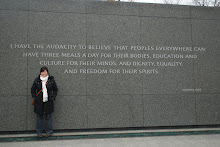The last month in Imugan was kind of a whirlwind of last visits, trips, and surprises. I finally felt completely adjusted, able to go out visiting friends without hesitation or self-doubt. My language learning kind of evened out after 3 or 4 months in, but I was still learning a lot even up until the end. Because I probably was at some sort of conversational level, I felt confident to invite myself to lunch with a friend, or drop by a granny's house in the afternoon, or stop and chat on the street. So there was a lot of chatting going on the last two months. My friend, the high school librarian, offered to show me her birthplace up north in a place called Kabayan, so we went up there the first week of December. Suddenly, there were a lot more friends interested in seeing the place, so all 8 or 9 of us rented a jeepney (the KEF vehicle) and drove the 4 hours to her home. Auntie Aida and Mona, who work in Imugan Food Processing, Manang Enita, who is Mona and my Scrabble buddy, her young son Joshua, Uncle Doroteo, my host dad, and Agosto, our driver joined the excursion. We didn't stop at a single restaurant for those 2 days - different relatives of hers hosted us and provided all our needs. Near the area are huge caves where the ancient Filipinos stored hanging coffins of their dead. We saw a museum that housed one of these old mummies, preserved over a thousand years ago. It was great fun. Below, you can see me, my friend Mona, and Joshua trying to look like mummies in one of the rock caves open to tourists... "Ooooooo! Mummmmmiiess!" we said to scare Joshua.

One of the best surprises of December was the news that my dad found time in his schedule to come out and visit before taking me home! It was good to have him there, since words aren't enough to communicate the hospitality and love of my family in Imugan. He got to experience it himself, and ate at the tables of some of my best friends, an honor for them and him. Below is a picture of us during a big family get-together dinner and singing time with my host mom's family.

The day before I left, the school where I taught put on a "Bon Voyage" program in which the students made fun of me in hilarious ways - spoofs of my teaching style (all the boys wore long skirts like I always do) and skits acting out my future (wouldn't you know it - I return in 5 years to get married to an Ikalahan man :). It was totally unexpected, and I was glad to see that they were as fond of me as I was of them. I did feel guilty for those times I lost my temper with them though... Being a teacher really made me respect the profession, and convinced me I don't want to do it again! In the evening, my dad and I helped here and there with the good-bye service preparations - pansit - stir-fry noodles - and tambotambong of course, a must-have dessert treat. I was really exhausted that last day because of all the good-byes, packing, and getting ready to leave, but the service was a wonderful coming-together of my friends from all different areas of the town. Pastors Albert and Norma wanted another pastor to conduct the service in English for my dad, but I insisted that Ikalahan was what I wanted. So they had me translate, and I think it was better that everyone understood rather than just two Americans.
I didn't really know how to convey what those people and that place had meant to me. My host dad gave me some good words - to carry on what I learned here in the U.S., so that the memories don't become stale but live on in who I am.
It's been strange slipping back into home and home-self, and I'm praying that the changes will be manifest here too. I'm trying to remember and live out the community that made me a part of them, that took ownership over my life. Last year, I used to write "the Lord's" on my palm so as to know that I'm not my own, but I think this year it was written on my heart. Learning in a strong Christian community in the Philippines helped me to know better that our lives are hidden in Christ, but I know it doesn't take time abroad for someone to realize that we don't belong to ourselves.
Okay. That's all for now. Maybe this blog needs to shut down for a while, because I feel weird communicating this way. Write me, or call sometime. Otherwise I'll see you soon, especially if you're a part of the Wheaton bunch.
Love, Kat(y)






 These are my host parents: Aunti Noemi and Uncle Doroteo. She took off his usual hat right before the picture, so he looks a little sheepish here because of his receding hair. They're wonderful people.
These are my host parents: Aunti Noemi and Uncle Doroteo. She took off his usual hat right before the picture, so he looks a little sheepish here because of his receding hair. They're wonderful people.




